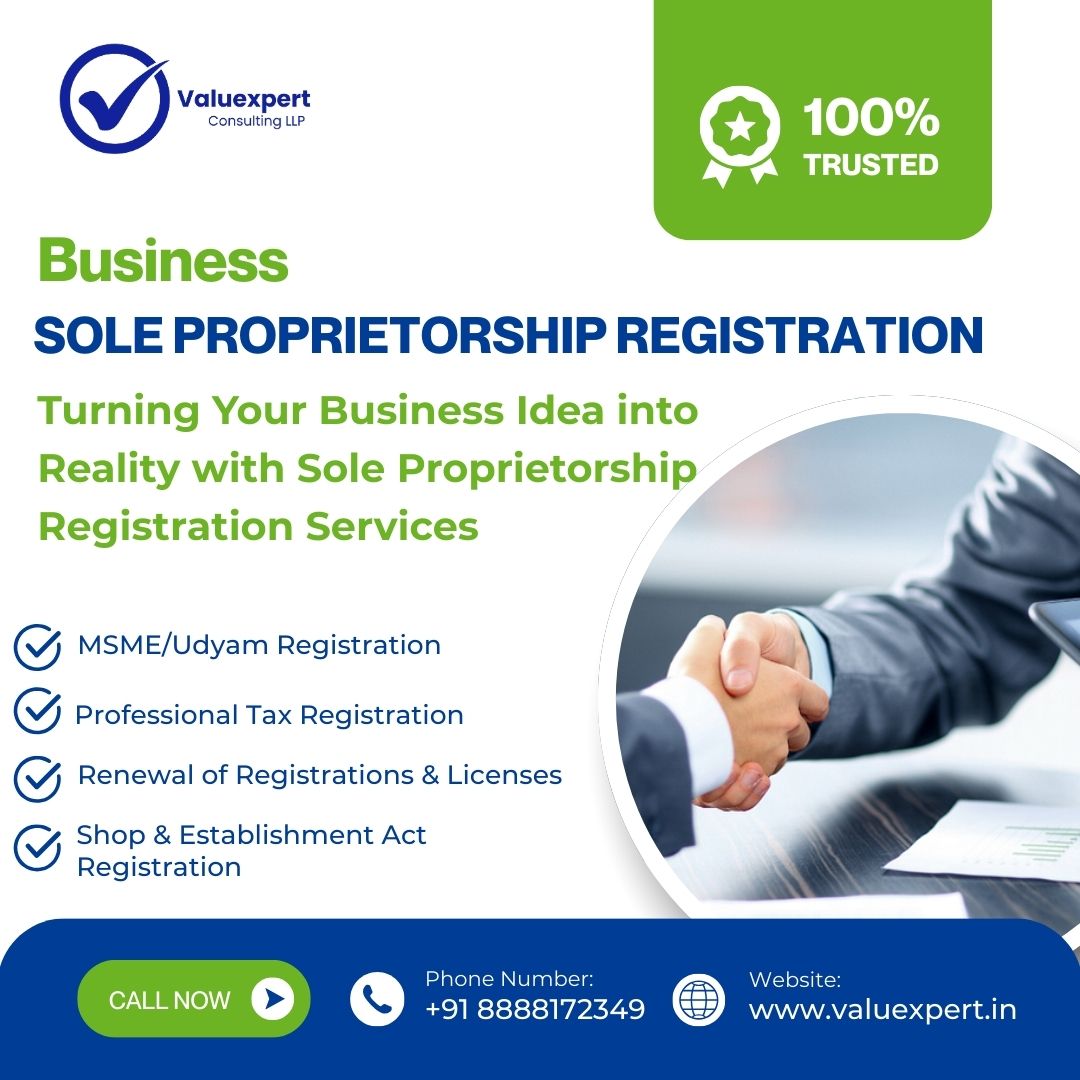Sole Proprietorship

"Your Business, Your Way – Start Strong with Sole Proprietorship!"
Introduction to Sole Proprietorship
Sole proprietorship is one of the oldest and simplest business structures to establish in India. A proprietorship is a type of business owned, managed, and controlled by one person - the proprietor. Since the proprietorship and proprietor are legally indistinguishable, starting this type of business is straightforward and involves minimal compliance requirements.
A proprietorship cannot have other partners or shareholders because the proprietor and the business are one entity. Furthermore, there is no limited liability protection for the proprietor against business activities. Thus, this business structure is ideal for very small businesses with no more than five employees
Our Services
ValuExpert can assist you in registering a Sole Proprietorship, an efficient business structure perfect for solo entrepreneurs. With our expert guidance and streamlined process, you can start your proprietorship firm registration online quickly and hassle-free. Begin your Sole Proprietorship registration with us and unlock the potential of your business ideas.
Proprietorship Registration in India
Registering a proprietorship in India does not involve a dedicated government-established process. Instead, recognition is achieved through various tax registrations mandated by relevant laws and regulations. One key registration is the GST (Goods and Services Tax) Registration, which must be obtained under the proprietor's name to formalize the business's proprietorship status.
Essential Licenses and Registrations for Proprietorships
To operate a proprietorship in India, the following licenses and registrations are essential:
1. Permanent Account Number (PAN) and Aadhaar Card: For business identification.
2. UDYAM Registration: Recognizes your business as a Micro, Small, or Medium Enterprise (MSME) and offers government benefits.
3. Goods and Services Tax (GST) Registration: Required if your business exceeds specific thresholds to collect and pay GST.
4. Shops and Establishment Act Registration: To comply with local labor regulations, depending on your business location.
Additional Mandatory Registrations in Maharashtra
5. Professional Tax Registration: Applicable to both employers and professionals in Maharashtra.
6. Maharashtra State Pollution Control Board (MPCB) Consent: Depending on the nature of your business, you may need to obtain consent under the Water (Prevention and Control of Pollution) Act, 1974, and Air (Prevention and Control of Pollution) Act, 1981.
Advantages of Proprietorship
1. Easy Registration: No formal incorporation or dissolution process is required.
2. Lower Compliance: Compliance requirements are minimal, mostly limited to Income Tax and GST.
3. Simplicity: No need for partners, shareholders, or directors.
4. Business Decisions: The proprietor makes all business decisions independently.
5. Complete Control: The proprietor has full control over all business operations, assets, revenue, and expenses.
Disadvantages of Sole Proprietorship
1. Funding: Raising funds is challenging as the business relies on the proprietor's savings, borrowings, and credit history.
2. Personal Liability: The proprietor's personal assets can be attached for business liabilities.
3. Business Continuity: The business dissolves upon the proprietor's death or disability.
4. Growth Restrictions: Limited fundraising options and lack of business continuity hinder growth.
5. Unincorporated Status: Sole proprietorships are unincorporated, lacking a centralized database for active or inactive status.
Registering a Proprietorship Online through ValuExpert
You can easily complete proprietorship firm registration online through ValuExpert. For registration, only the PAN and Aadhaar card of the business owner are required. We assist in obtaining the following registrations within 7 days:
After obtaining GST registration, ValuExpert will assist in securing UDYAM registration using the Aadhaar card, PAN card, and GST certificate.
Timelines for Sole Proprietorship Registration
Registration through ValuExpert can typically be completed in less than 07 days, subject to government and bank processing timelines.
Proprietorship Business Activities
A proprietorship can undertake various business activities, except for sectors requiring specialized government approvals (e.g., banking, insurance, financial services).
Compliances for Proprietorship
Key compliance requirements include:
- Income Tax Filing: Using forms ITR-3 or ITR-4.
- GST Return Filing: Monthly and quarterly returns as applicable.
- TDS Returns: If employing staff or purchasing goods/services above a certain threshold.
Additional compliance may apply based on industry and location.
